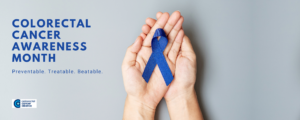
Colorectal Cancer Awareness Month – March 2024
important facts
by Colorectal Cancer Alliance:
- Screening is the most important way to prevent or detect this disease early when it is most treatable. If detected early, the survival rate for colorectal cancer is 90%.
- Colorectal cancer is the second deadliest cancer in the United States. However, it is one of the few cancers that is preventable.
- The American Cancer Society estimates that there will be 152,810 new cases of colorectal cancer in 2024.
This month, join District Health Department #10 and raise colorectal cancer awareness by wearing blue on Friday, March 1st. Wear blue to enable allies around the world to join our mission to end colorectal cancer. The entire month of March is National Colorectal Cancer Awareness Month.
Colorectal cancer (CRC) is a disease of the colon or rectum, which is part of the digestive system. Unlike most cancers, colorectal cancer is often preventable through screening and highly treatable if detected early. Most cases of colorectal cancer occur in people over the age of 45, but the disease is increasingly affecting younger people.
Risk factor
Anyone can develop colorectal cancer, but some conditions may increase your risk.
- Inflammatory bowel diseases such as Crohn’s disease and ulcerative colitis.
- Personal or family history of colorectal cancer or colorectal polyps.
- Genetic syndromes such as familial adenomatous polyposis (FAP) and hereditary nonpolyposis colorectal cancer (Lynch syndrome).
- Black/African Americans and Ashkenazi Jews are at higher risk.
Common symptoms
Colorectal cancer often develops without symptoms. When this happens, you may experience the following symptoms:
- blood in or on the stool
- Continued abnormal bowel movements such as constipation or diarrhea
- Stomach aches, pains, and cramps that don’t go away
- Weakness and/or fatigue
- Losing weight for no reason
When should I see a doctor?
The sooner the better! Symptoms of colon and rectal cancer can be associated with many other health conditions. Only a medical professional can determine the cause of your symptoms.
Early signs of cancer often do not include pain. If you experience any symptoms, you should consult your health care provider. Early detection can save your life.
quick links

Can you be more specific about the content of your article? After reading it, I still have some doubts. Hope you can help me.